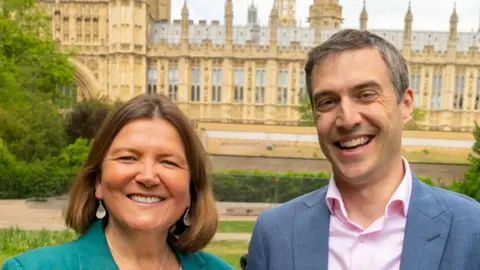Voting has officially commenced in the Green Party of England and Wales, as an eager and diverse membership base stands ready to choose new leadership that could direct the party’s future strategies and values. With significant political shifts anticipated in the coming years, the election marks a critical juncture for the Greens, fostering new dynamics within their organizational framework.
Current co-leader Adrian Ramsay has aligned himself with MP Ellie Chowns, forming a duo that aims to leverage their collective years of political experience. This collaborative effort comes in the context of Carla Denyer’s recent announcement that she will not pursue re-election, leaving a void that Ramsay and Chowns seek to fill by presenting a strong and unified front to the party membership. The decision emphasizes continuity and the fulfillment of established party principles, as they advocate for a leadership grounded in proven expertise and stability.
Chowns, a former Member of the European Parliament (MEP), along with Ramsay, will vie against a formidable opponent in Zack Polanski, the current deputy leader and a figure known for his contentious stances as a member of the London Assembly. Polanski has branded himself as an “eco-populist,” highlighting a platform that emphasizes transformative change and a bold approach to leadership. His narrative revolves around the necessity for fresh perspectives capable of resonating with a wider electorate, envisioning a future where the Green Party can expand its influence in a rapidly evolving political landscape.
The electoral process allows votes from any member who joined the party before midnight on August 30, with results expected to be unveiled on September 2. This timeline indicates a concerted effort to ensure that all members have an opportunity to participate in a timely and meaningful manner.
Crafting their narrative, Ramsay and Chowns promote a message of turning values into political power, asserting their intent to cultivate a responsible and proactive leadership style. Conversely, Polanski’s campaign challenges the status quo, critiquing the current leadership’s perceived deficiencies in effectively confronting Labour and Reform UK. He argues for a shift away from what he characterizes as a cautious and timid approach, pushing for a resurgence of assertiveness within the party.
Recent campaign moments have added drama to the unfolding election, notably during an interview where Ramsay hesitated to express admiration for Polanski. This awkward exchange drew attention to underlying tensions, suggesting a more profound rift between varying factions of the Green Party. Ramsay’s diplomatic yet evasive response raised eyebrows and provided an intriguing glimpse into inter-party dynamics that may influence member sentiments ahead of the election.
The Green Party’s electoral process is designed to offer a degree of internal democracy that many competing parties lack; leaders or co-leaders have a somewhat less pronounced role in policy-making, which is primarily remitted to the membership. Instead, their focal duty lies in portraying coherent, vision-driven strategies and fostering communication that resonates with broader audiences.
In parallel with the leadership election, members will also engage in a deputy leadership election, where they will choose from a broad pool of nine candidates, further manifesting the party’s commitment to expanding representation and inclusivity in its leadership. The twin elections reflect a movement toward generative discussions surrounding the party’s future and aspirations.
As both leadership hopefuls prepare to navigate these upcoming milestones, the question looms: what will be the Green Party’s trajectory moving forward? With partisan divides growing more pronounced in the UK political landscape, positions taken now could fortify the party’s long-standing goals or lead to a significant reevaluation of its identity as it attempts to capture a larger share of the electoral pie. The coming weeks promise to be pivotal in shaping the vision for a party that has experienced considerable growth but now stands at a crossroads, set to define its role in the future of UK politics.











